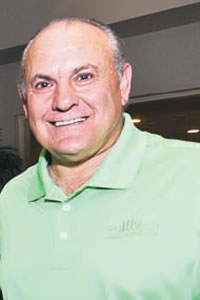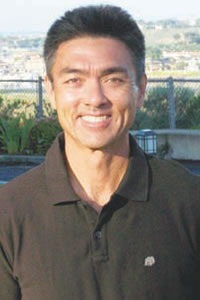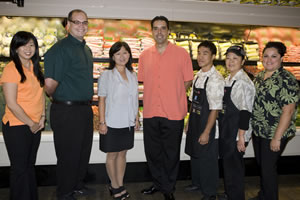School of Grocery

Foodland’s assistant director of produce Tammy Yoshino and first
assistant store director John Nary, both program participants, with company director of training Kary Morihara
A cutting-edge program at Hawaii community colleges, developed by a Kaua’i High grad and endorsed by local grocers, provides new opportunities for career advancement to those working in the field
Attention, students. Class is in session. Today’s lesson is the art and science of retailing success in the fast-paced 21st century. Open your books and your minds to insights from the pros. You’ll become a better consumer in the process.
The occasion for this schooling is the 90th annual Western Association of Food Chains (WAFC) convention April 2 to 6 at Hilton Hawaiian Village. Some 1,200 retailers and suppliers are putting their heads together to ponder “Education: The Sustainable Advantage.”
Who says you can’t have a think tank in paradise?
Sharing ideas and learning from people such as Jeb Bush, former governor of Florida, and William Taylor, author and founding editor of Fast Company, is serious business for executives from America’s largest food chains in the western U.S.
WAFC members represent more than 7,500 supermarkets in 14 Western states – and $200 billion in annual sales. Can you say “clout”?
Joe Detro, Foodland senior vice president of sales and operations – and WAFC board member – says, “Ongoing education is essential to advancement in our industry today.”
The food industry exec, who started in the business 30 years ago as a “bag boy,” says that one must have a hunger for knowledge to succeed. If you’re not paying attention to constant changes in the marketplace, you’re losing a competitive advantage.

Safeway Hawaii district manager George Glukfeld (in orange) with
program participants Tammy Kajiyama, Jessica Patino and Mike Nojo at Safeway’s Manoa store. Leah Friel photos
Today’s consumer is smarter, fastidious about customer service, and empowered with communications tools such as multimedia cell phones and social networking circuits including Facebook and Twitter. Give them an irresistible bargain or a bad service experience, and word will be out before you can dial 911.
Someone who knows that and has structured an academic program to help retailers stay ahead of the curve is Ross Higa, assistant professor of management, Business Technology Division, at Leeward Community College. Higa, a native of Kaua’i, is statewide coordinator of the Retail
Management Certification Program, endorsed and inspired by WAFC for community colleges.
The 10-course curriculum is available at more than 160 colleges and satellite locations in 10 states including Hawaii. Thousands of graduates have been awarded WAFC certificates and cash honorariums.
The course is recommended for food industry retailers, wholesalers, suppliers, brokers and manufacturers. But it is not limited to that sector, making discussions and sharing in the classroom a dynamic experience.
As Professor Higa puts it, “Anyone looking for personal growth or career advancement should attend.
“The 10 content areas are directly linked to core competencies required for success at the managerial level. All courses are accredited, and nearly all are transferable to a four-year college or applicable to an associate degree.”
Courses cover microcomputer applications, oral communications, written communications, business math, bookkeeping or accounting, introduction to management, marketing, human resources management, retail management and merchandising, and leadership and human relations.

Foodland VP Joe Detro
Both classroom and online instruction are available. The flexibility of traditional face-to-face classroom instruction, as well as via satellite and Internet, enables students to complete the certificate while working part time or full time.
Additionally, Higa tells us, courses are structured in phases so there are stepping stones to certification. Nothing like having built-in motivation to take learning to the next step.
It is understandable, considering that enrollees are mid-level or upper-level supervisors whose time demands are already stretched. Dealing with their commitment to complete the program is the biggest challenge.
But it’s the nature of vocational training, according to Higa, who joined Leeward Community College in 1986 after a stint as a banker. He realized that his calling was education and molding human capital.
Higa, 52, was born on Oahu but raised on Kaua’i, where he attended Kaua’i High School. At KHS, he played tennis and drums in the band, later working as a tennis pro at Coco Palms and playing for 10 years in the band Jetstream. He has a bachelor’s degree in business administration-finance from the University of Hawaii at Manoa.
“The tie-in with community colleges is to make the certification process accessible and affordable for industry workers,” he says. “At the inception, this program was primarily focused on Oahu, but now it has reached the Neighbor Islands through online instruction, and enrollment has gone through the roof. Fortunately, we didn’t have to create any new courses when the program was developed. It was just a matter of packaging what we already had in the management curriculum.”

Ross Higa of Leeward CC
He says Kaua’i residents can take some classes at KCC and others online. For more information, call Higa at 808-551-5289.
This has allowed the program to take root and roll out quickly into the community. Among its supporters are major employers such as Foodland, Safeway, Times and Whole Foods supermarkets.
While competitive in the trade, they are united when it comes to educational opportunities for their workers.
The mandate comes from the top, where CEOs such as Steve Burd, chairman of Safeway Inc., and Brad Alford, chairman of Nestle USA – both WAFC convention headliners – heartily endorse the program.
George Glukfeld, Safeway Hawaii district manager, underscores the importance of keeping workers motivated and engaged in their jobs. The 24-year veteran of the food business started as a general merchandise clerk, and today oversees a flourishing and growing retail enterprise for the Safeway chain. As a new Hilo store opens this month and construction begins on a new Honolulu store on Beretania Street, there is a steady demand for quality management and supervision in all departments.
“The Retail Management Certification Program clearly adds to an associate’s value to the industry,” says Bob Stout, president of Times Super Market. “Those who complete the program or are pursuing the certificate show great personal initiative. The experience and knowledge gained by the classes are invaluable and definitely enhance one’s chances for promotion.”
There you have it, from someone who has 39 years of experience in the food chain business. Stout started as a “bottle boy” in high school when soda pop bottles were sorted for returns to manufacturers.

(from left) Foodland’s Tammy Yoshino, John Nary and Kary Morihara with
Safeway’s George Glukfeld, Mike Nojo, Tammy Kajiyama and Jessica Patino. Leah Friel photo
Admittedly, a lot has changed from the era of quaint mom-andpop grocery stores. Technology has revolutionized nearly every facet of the operations and merchandising of modern stores. Not the least of this is the personalized data mining that goes on when one swipes his or her frequent shopper card at the cashier stand.
But all the electronic wizardry in the world won’t change the intimacy and bond one has with the corner grocery store. Our relationship with merchants who sell life’s essentials – particularly food – is basic to everyday existence.
Let’s face it, many of us see our grocery store clerk more frequently than we see our moms.
Being creatures of habit, we tend to navigate the aisles in a predictable pattern, fuss when inventory is relocated, and favor the same checkout clerk who greets us by name and knows instinctively whether we want paper or plastic bags.
This is known in the business as “high touch.” It’s the “human touch” that overrides sophisticated technology and glitzy marketing. To lack it is the closest path to a “going out of business” sign.
Our professor of professionalism, Ross Higa, is a keen observer of local customer service as both an educator and consumer.
“Fifty percent of the classes I teach are customer service-related,” he says. “My observation is that in the general retail landscape, customer service in grocery stores has improved a lot over the years. In fact, it’s great.”
That’s quite a compliment coming from someone who reads customer service like a book. Higa says impressive customer service models are five-star hotels and supermarkets.
If the Retail Management Certification Program is any gauge, WAFC and the community college system can take some credit for that. It’s about “raising all boats” in the name of professionalism, they profess. Now that’s a saleable commodity we can all buy.
Higa’s hope for the retail certification program is that it finds the proper balance for management enlightenment that has both long-term commitment and sustainability.
He also wants it to be a shining light in the community college system that distinguishes itself as an accountable business-education partnership.
It’s said that “real leadership is dreaming bigger for others than they dream for themselves.”
If that’s the bottom line, this educational vision will pay dividends for the future.
Class dismissed.



